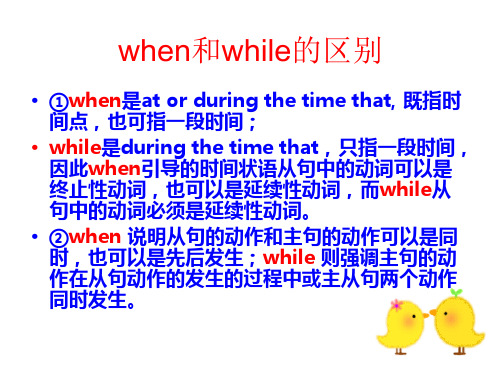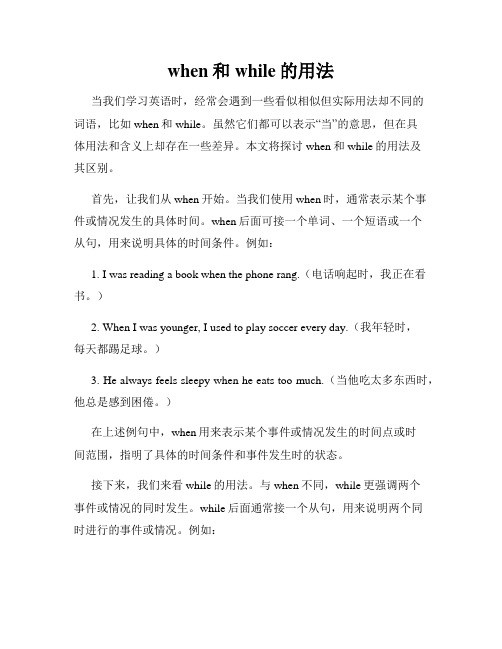牛津译林版 八年级上册 Unit8过去进行时when与while的用法 语法学案(含部分答案)
when和while的用法和区别

when和while的用法和区别When 和 While 的用法和区别在英语学习中,when 和 while 这两个词常常让学习者感到困惑。
它们都可以用来引导时间状语从句,但在具体的用法和所表达的含义上却存在着一些差异。
下面我们就来详细探讨一下 when 和 while 的用法和区别。
一、When 的用法1、表示“当时候”,引导的动作可以是短暂性的,也可以是持续性的。
例如:When I got home, my mother was cooking (我到家时,妈妈正在做饭。
)在这个句子中,“got home”是短暂性动作。
2、还可以表示“就在这时,突然”。
例如:I was walking along the street when suddenly someone called me (我正在街上走着,突然有人叫我。
)3、 When 可以用来询问具体的时间。
例如:When did you come back? (你什么时候回来的?)二、While 的用法1、表示“在期间,当时候”,引导的动作通常是持续性的。
比如:While I was reading, he was playing games (我在读书的时候,他在玩游戏。
)这里“was reading”和“was playing games”都是持续性动作。
2、强调主句动作和从句动作同时发生。
例如:While he was doing his homework, I was watching TV (他在做作业的时候,我在看电视。
)三、When 和 While 的区别1、动作的性质When 引导的从句动作既可以是短暂性的,也可以是持续性的;而while 引导的从句动作通常是持续性的。
例如:When the doorbell rang, I was having a bath (门铃响时,我正在洗澡。
)(“rang”是短暂性动作)While I was sleeping, the phone rang (我睡觉的时候,电话响了。
8B过去进行时when,as和while的区别.

• 二、when从句的谓语动词可以在主句谓语动作之前、之 后或同时发生;while和as从句的谓语动作必须是和主句 谓语动作同时发生。 • 1.从句动作在主句动作前发生,只用 when。 • ①When he had finished his homework,he took a short rest.(finished先发生)当他完成作业后,他休息了一会 儿。 • ②When I got to the airport,the guests had left.(got to后发生)当我赶到飞机场时,客人们已经离开了。 • 2.从句动作和主句动作同时发生,且从句动作为延续性 动词时,when,while,as都可使用。 • ①When /While /As we were dancing,a stranger came in.(dance为延续性动词)当我们跳舞时,一位陌 生人走了进来。 • ②When /While /As she was making a phonecall,I was writing a letter.(make为延续性动词)当她在打电 话时,我正在写信。
while连接的句子,后面必须用进行时(现在/ 过去进行时) 1) A car hit her while she was thinking about a question. 2) The books fell off from the shelf while they were listening to the radio. 3) While we are playing football, a noise comes from downstairs.
• 一、when可以和延续性动词连用,也可以和短暂 性动词连用;而while和as只能和延续性动词连用。 • ① Why do you want a new job when you‘ve got such a good one already?(get为短暂性动词) 你已经找到如此好的工作,为何还想再找新的? • ②Sorry,I was out when you called me.(call 为短暂性动词)对不起,你打电话时我刚好外出 了。 • ③Strike while the iron is hot.(is为延续性动词, 表示一种持续的状态)趁热打铁。 • ④ The students took notes as they listened.(listen为延续性动词)学生们边听课 边做笔记。
2017 9 牛津译林英语 8A unit8 语法专题八 过去进行时及when, while, as

牛津译林英语8年级上册Unit8 语法专题八:the past continuous tense & while, when and as一、语法知识要点:1. 过去进行时主要表示:■在过去某一时刻正在进行的动作(a)They were eating breakfast at 7:00 am yesterday.(b) I was writing a letter at this time yesterday.(c) I was sleeping when the earthquake started.(d) What were they doing at that time last week?■在过去某段时间一直在进行的动作(a) From 1983 to 1998, he was teaching at Yale.(b) They were building a dam last winter.(c) What were you doing between 7 o’clock and 9 o’clock yesterday?2. 过去进行时的句式(1) 基本结构:was / were + verb-ingI was doing some shopping.People were running wildly.(2) 否定式:was / were not + verb-ingI was not reading.People were not running wildly.(3) 疑问句:将was / were 调到主语前Was he running? Yes, he was. / No, he wasn’t.Were they running? Yes, they were. / No, they weren’t.3. 连词while, when and as 与过去进行时1) when, while 和as 这三个词都有“当……时候”的意思。
when和while的用法和区别

when和while的用法和区别When 和 While 的用法和区别在英语学习中,when 和 while 这两个词都是用来引导时间状语从句的,但其用法和所表达的含义却有所不同。
理解它们的用法和区别对于我们正确使用英语、准确表达时间关系至关重要。
首先,我们来看看 when 的用法。
When 既可以表示“在……时候”,也可以表示“就在这时”。
当 when 表示“在……时候”时,它所引导的从句中的动作可以是瞬间性动作,也可以是持续性动作。
比如:“When I was a child, I often played in the park”(当我还是个孩子的时候,我经常在公园玩耍。
)在这个句子中,“was a child”是持续性动作。
再比如:“When the bell rang, we all stopped talking”(当铃声响起时,我们都停止了讲话。
)这里“rang”就是瞬间性动作。
而当 when 表示“就在这时”时,通常用于以下结构:“be doing sth when”(正在做某事,就在这时……)或者“be about to do sth when”(正要做某事,就在这时……)。
例如:“I was walking along the street when it began to rain”(我正在街上走着,就在这时开始下雨了。
)“I was about to leave when the phone rang”(我正要离开,就在这时电话响了。
)接下来,我们看看 while 的用法。
While 通常表示“在……期间”,强调主句和从句的动作在同一时间段内同时发生,并且从句中的动作通常是持续性的。
例如:“While I was doing my homework, my mot her was cooking dinner”(当我在做作业的时候,我妈妈正在做晚饭。
)在这个句子中,“was doing my homework”和“was cooking dinner”是同时进行的持续性动作。
when和while的用法

when和while的用法当我们学习英语时,经常会遇到一些看似相似但实际用法却不同的词语,比如when和while。
虽然它们都可以表示“当”的意思,但在具体用法和含义上却存在一些差异。
本文将探讨when和while的用法及其区别。
首先,让我们从when开始。
当我们使用when时,通常表示某个事件或情况发生的具体时间。
when后面可接一个单词、一个短语或一个从句,用来说明具体的时间条件。
例如:1. I was reading a book when the phone rang.(电话响起时,我正在看书。
)2. When I was younger, I used to play soccer every day.(我年轻时,每天都踢足球。
)3. He always feels sleepy when he eats too much.(当他吃太多东西时,他总是感到困倦。
)在上述例句中,when用来表示某个事件或情况发生的时间点或时间范围,指明了具体的时间条件和事件发生时的状态。
接下来,我们来看while的用法。
与when不同,while更强调两个事件或情况的同时发生。
while后面通常接一个从句,用来说明两个同时进行的事件或情况。
例如:1. I like to listen to music while I'm cooking.(我喜欢一边做饭一边听音乐。
)2. While he was studying for the exam, his friends were playing video games.(他在备考期间,他的朋友们正在玩电子游戏。
)3. She was walking her dog while talking on the phone.(她一边遛狗一边打电话。
)在上述例句中,while表示两个事件或情况的同时发生,强调了两者的同时性和并行性。
除了表示时间上的区别外,when和while还可以用于强调不同的语境。
when while 用法

when while 用法When和While是英语中经常使用的两个单词,它们在英语语法中有着不同的用法,尤其是在时间和条件从句的表达上。
在此,我们将分步骤地讲解这两个单词的用法。
第一步,了解"When"的用法:When通常用来表示一种时间上的触发事件,用在时间从句中。
当主句中的条件满足时,时间从句中的事件才会发生。
例如,“When I arrived at the party, everyone was already there.”(当我到达派对时,所有人都已经到齐了。
)除此之外,"when"在英语中还可以表示"每当"的意思,例如:“I get a headache when I eat too much chocolate.” (每当我吃太多巧克力时,我头疼。
)这个句子中,“when”表示一个经常性的事件。
第二步,了解"While"的用法:While通常用来表示两件事同时发生,用在条件从句中。
当主句中的条件满足时,条件从句中的事件也会同时发生。
例如,“While I was cooking dinner, the phone rang.”(当我在做晚餐时,电话响了。
)此外,While还可以表示“当...的时候”,例如:“While I was walking home, I saw a beautiful sunset.”(当我走回家的时候,我看到一道美丽的日落。
)第三步,了解When和While的区别:When和While用于从句中时,从句中动词的形式也有所不同。
当我们用“When”表示时间从句时,从句中的动词通常采用一般过去时(past simple)或过去进行时(past continuous)。
而用“While”表示条件从句时,从句中的动词通常采用过去进行时。
此外,When通常指单一的事件,而While则表示同时性的事件。
牛津译林版八年级上册英语Unit 8 语法讲解和练习-(含答案)
Unit 8 Natural disasters一、过去进行时1.定义过去进行时表示过去某一时刻正在进行的动作或过去某一段时问一直在进行的动作。
如:I was doing my homework at 8 P.m.1ast night. 昨晚8点我正在做家庭作业。
What were you doing last month?上个月你一直在做什么?2.构成过去进行时由‘‘助动词be的过去式was/were+现在分词”构成。
如:The boy was cleaning the house.那个男孩正在打扫房子。
They were playing football at four yesterday afternoon.昨天下午四点他们在踢足球。
3.句式变化(1)一般疑问句及回答变成一般疑问句时应将was或were移到句首。
如:Was it raining at 6 0’clock this morning? 今天早上六点钟天正在下雨吗?Yes, it was./No, it wasn’t.是的。
/不是。
Were they building a dam last winter? 去年冬天他们在建大坝吗?Yes, they were./No, they weren’t. 是的,他们在建。
/不,他们没有。
(2)否定句肯定句变成否定句时在was/were后加not,was not常缩写为wasn’t,were not常缩写为weren’t。
如:My brother was not/wasn’t playing computer game last night.昨天晚上我弟弟不在玩电脑游戏。
We were not/weren’t shopping at th is time yesterday.昨天这个时候我们不在购物。
4.用法(1)表示过去某一时刻正在进行的动作。
动作发生的特定时间常用一个时间短语或时间状语从句来表明。
when 和 while 的用法
"when" 和 "while" 都是英语中表示时间的连词,但它们的用法和含义略有不同。
1. "when" 的用法:
* "when" 通常用于表示某件事情正在发生的时候,另外一件事情发生了。
* "when" 可以用于各种时态,包括过去时、现在时和将来时。
* "when" 也可以用于表示条件,相当于 "if"。
* "when" 还可以用于表示对比。
* "when" 引导的时间状语从句通常用一般现在时表示将来时。
2. "while" 的用法:
* "while" 通常用于表示两个持续进行的动作或状态之间的对比或矛盾。
* "while" 也可以用于表示两个相反的事物或概念之间的对比或矛盾。
* "while" 可以用于表示两个或多个并行的事物或概念之间的对比或矛盾。
* "while" 可以用于表示某种行为或状态的持续时间。
* "while" 可以用于表示条件,相当于 "if"。
* "while" 引导的时间状语从句通常用进行时态。
总的来说,"when" 和 "while" 的用法比较相似,但它们在具体的使用中还是有一些区别的。
需要根据具体的语境和需要表达的含义来选择使用哪个连词。
whenwhile的用法时态
whenwhile的用法时态一、 when和while的基本用法当我们学习英语语法时,经常会遇到when和while这两个词。
它们都是连接词,用于引导时间状语从句,表示某个动作或状态发生的时间。
但是,它们在使用时有着不同的规则和含义。
1.1 when的用法当我们想要表达一个具体的时间点或特定条件下发生的事件时,我们可以使用when来引导时间状语从句。
例如:- I was studying at the library when she called me.- We always go to the beach when it's sunny.在上面的例子中,when引导了一个描述过去某个具体时间点或条件下发生事件的从句。
1.2 while的用法与when不同,while通常用于描述一个持续性或长时间跨度内发生的事件。
而不是特定瞬间或条件下发生的事件。
例如:- She was reading a book while waiting for the train.- I like to listen to music while cooking dinner.在这些例子中,while引导了描述同时进行活动、互相重叠的从句。
二、不同时态下使用when和while根据句子所述事情发生的时间不同时态所需能力,典型地有三种不同类型。
2.1 过去时态(Past Tense)当我们想要描述过去某个特定时刻或条件下发生的事件时,可以使用过去时态(Past Tense)结合when引导从句。
例如:- I was walking in the rain when I saw her.- They were having dinner when the phone rang.在这些例子中,主句和从句都采用了过去时态,从而表达出两个事件在过去某一时间点或条件下同时发生。
2.2 进行时态(Present Continuous)当我们想要描述现在或现阶段正在进行的活动时,可以使用进行时态(Present Continuous)结合while引导从句。
when和while的用法
when和while的用法when和while都是英语中常见的从属连词,用于引导时间状语从句。
它们在用法和意义上有一些区别,下面将详细介绍它们的用法。
1. when的用法当我们引导一个时间状语从句表示一个特定的时间点或者一个瞬间事件发生时,我们使用when。
when可以用于过去、现在和将来的时间。
以下是一些使用when的例句:- I met her last week when I was walking in the park.(当我在公园散步时,我在上周遇到了她。
)- We always have lunch at 1 o'clock when we are at work.(当我们在工作时,我们总是在1点吃午饭。
)- I will call you when I arrive at the airport.(当我到达机场时,我会给你打电话。
)2. while的用法当我们引导一个时间状语从句表示一个持续的时间段,也就是一个动作或状态在另一个动作或状态发生期间发生时,我们使用while。
while通常用于描述两个同时进行的动作或状态。
以下是一些使用while的例句:- He was watching TV while she was cooking dinner.(当她在做晚饭时,他在看电视。
)- The children were playing in the garden while their parents werehaving a conversation.(当他们的父母在交谈时,孩子们在花园里玩耍。
)- I listen to music while I'm driving to work.(当我开车去上班时,我会听音乐。
)3. 区别和注意事项- 使用when时,主句和从句的动作通常是相互独立的,没有相互影响。
而使用while时,主句和从句的动作通常是相互关联的,互相影响。
- 1、下载文档前请自行甄别文档内容的完整性,平台不提供额外的编辑、内容补充、找答案等附加服务。
- 2、"仅部分预览"的文档,不可在线预览部分如存在完整性等问题,可反馈申请退款(可完整预览的文档不适用该条件!)。
- 3、如文档侵犯您的权益,请联系客服反馈,我们会尽快为您处理(人工客服工作时间:9:00-18:30)。
3.Mary _____a dress when she cut her finger. A.made B.is making C.was making D.makes
举一反三
1.As she _____the newspaper ,Granny _____asleep. A.read ;was falling B.was reading ;fell C.was reading;was falling D.read;fell
9.We heard a cry when we ______ TV last night. A were watching B would watch C watch D watched
10.She asked him whether he _____ back for lunch. A come B was coming C came D had come
2.他在骑自行车的时候,伤了腿。 While he was riding a bike, he hurt his leg.
3.我在做作业,我妈妈在看电视。 While I was doing my homework, my mother was watching TV.
4.他弟弟在看电视的时候,他在看报纸。 He _ a newspaper while his brother______TV.
---I’m sorry to hear that.
A.made
B.was making
C.makes
D.is making
4.It started to rain while I __was flying___(fly) a kite in the park.
5.Lily was shopping while Lucy __was taking__(take) exercise at 6:00 this morning.
A.was listening; is watching
B.listened; were watching
C.was listening;watched
D.was listening; were watching
3.—Yesterday Suzy fell over and was hurt badly while she _B____a snowball.
课堂检测
1.The twins didn’t go to the theatre. They __D____the light music at that time.
A. have enjoyed
B.will enjoy
C.are enjoying
D.were enjoying
2.She _D____to an English program while her parents_____TV.
总结:1.when 之后可长亦可短,while 之后只可长; 若是两个都为长,while 来把纽带当。
2.when 引导的过去进行时要注意句中两个动作,瞬间动词用的是动词的过去式,延续性动词用的是现在分词 形式;while 在过去进行时中使用时,后面必须是进行时且动词是 延续性 动词。
例题精讲
1.我在吃早餐的时候,电话响了。 When I was having breakfast, the telephone rang. 2.当我进教室的时候,老师正在等我。 When I entered the classroom, the teacher was waiting for me.
三、过去进行时的两大掌门:when, while 的用法与区别
when
“当…时候”:既可指时间点,也可指时间段,从句中的谓语动词可用延续性动词,也可 用短暂性动词。从句中的动词可表动作,也可表状态。从句的动作可与主句的动作同时发 生,也可在主句动作之前或之后发生。
while
“在…的时候,在…期间”指一个时间段,从句的谓语动词必须是延续性的动词。强调主 句的动作与从句的动作同时发生或主句的动作发生在从句的动作过程中
二、句子结构:
主语+was/were+v-ing+其他 (注:doing 就是现在分词,词形变化与现在进行时相同) Eg:Mike was watching TV this time yesterday. 否定式:Mike wasn’t watching TV this time yesterday. 疑问句:Was Mike watching TV this time yesterday?
5. What ______ from three to four yesterday afternoon? A have you done B had you done C did you do D were you doing
6. – I call you yesterday evening, but there was no answer. - Oh., I’m sorry I _____ dinner at my friend’s home. A home B had C was having D have had
—No, they _____. They _____ (clean) the classroom. 17. ______ it ______(rain) when you left school? Yes, it ____. (No, it ____) 18. What _____ your father _____ (do) when he was your age?
11.Could you tell me when ______? A she is coming B she was coming C will be come D is he coming
12.The teacher ______ when I came into the classroom. A is drawing B draws C has drawn D was drawing
The thief came in , I was sleeping. The thief came in, I was sleeping. The thief came in, i was sleeping. The thief was carrying my TV out, i was sleeping.
二、单项选择
1. It was Friday evening. Mr and Mrs. Green _____ ready to fly to England. A. are getting B. get C. were getting D. got 2. Lei Feng _____ always _____ of others when he ______ in the army. A. is, thinking, was B. was, thinking, is C. did, think, is D. was, thinking, was 3. A girl ______ my pen fall off the table when she _____ me. A. saw, passed B. was seeing, passed C. was seeing, passed D. was seeing, was passing 4. We ____ for tom at ten last Sunday. He often kept us ______. A. were waiting, waiting B. were waiting, wait C. waited, waiting D. waited, wait 5. He ____ his father on the farm the whole afternoon last Saturday. A. helps B. would help C. was helping D. is helping 6. While mother _______ some washing, I _____ a kite for Kate. A. did, made B. was doing, made C. was doing, was making D. did, was making 7. “Why_______ you angry then?” “Because they ______ too much noise.” A. are, were making B. were, were making C. are, made D. were, made 8. He ____ some cooking at that time, so _____ me A. did, heard B. did, didn’t hear C. was doing, heard D. was doing, didn’t hear
7. My mother _____ while my father _____TV. A cooked; was watching B was cooking; was watching C was cooked; watched D cooked; watched
8. When I got home, my son _____ the music. A am listening to B listened to C was listening to D was listening
牛津译林版八年级上册 when 和 while 的语法用法讲义
授课日期及时段
教学目标
1.使学生掌握过去进行时 was/were+v-ing 的含义,并能正确使用 2.使学生能正确使用 when, while,as 引导的时间状语
重点难点
